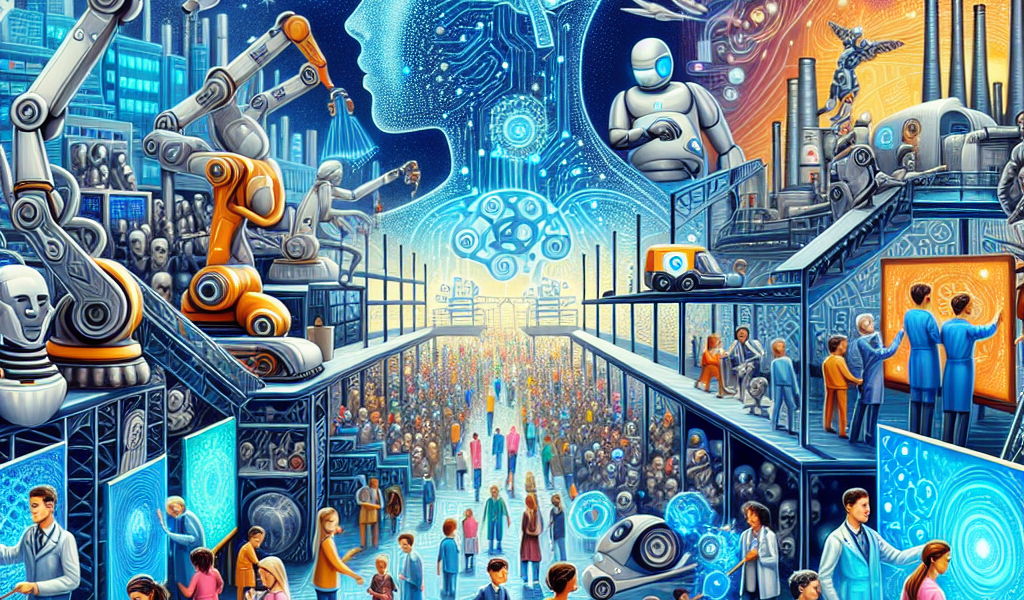-
Table of Contents
“Revolutionizing Tomorrow: The Transformative Power of AI Across Industries”
Introduction

The Future of AI: How Artificial Intelligence Is Transforming Industries
Artificial Intelligence (AI) is no longer a concept confined to the realms of science fiction; it has become an integral part of modern industry, driving unprecedented changes across various sectors. From healthcare and finance to manufacturing and retail, AI technologies are revolutionizing the way businesses operate, enhancing efficiency, accuracy, and innovation. This transformative power of AI is reshaping traditional business models, enabling predictive analytics, automating complex processes, and fostering the development of intelligent systems that can learn and adapt. As AI continues to evolve, its impact on industries is expected to grow exponentially, offering new opportunities and challenges that will define the future of work and economic growth. This introduction explores the profound ways in which AI is transforming industries, highlighting key advancements and the potential for future developments.
Healthcare: Revolutionizing Patient Care with AI
Artificial intelligence (AI) is rapidly transforming various industries, and healthcare is no exception. The integration of AI into healthcare systems is revolutionizing patient care, offering unprecedented opportunities for improving diagnosis, treatment, and overall patient outcomes. As AI technologies continue to advance, their applications in healthcare are becoming more sophisticated, promising a future where medical care is more efficient, personalized, and accessible.
One of the most significant ways AI is impacting healthcare is through enhanced diagnostic capabilities. Machine learning algorithms, a subset of AI, are being trained to analyze vast amounts of medical data, including imaging scans, pathology slides, and electronic health records. These algorithms can identify patterns and anomalies that may be missed by human eyes, leading to earlier and more accurate diagnoses. For instance, AI-powered imaging tools are now capable of detecting early signs of diseases such as cancer, often before symptoms manifest, thereby enabling timely intervention and improving patient prognosis.
In addition to diagnostics, AI is also transforming the treatment landscape. Personalized medicine, which tailors treatment plans to individual patients based on their genetic makeup and other factors, is becoming more feasible with the help of AI. By analyzing genetic data and other relevant information, AI can predict how patients will respond to different treatments, allowing healthcare providers to choose the most effective therapies with fewer side effects. This approach not only enhances the efficacy of treatments but also reduces the trial-and-error process that often accompanies traditional methods.
Moreover, AI is playing a crucial role in streamlining administrative tasks within healthcare institutions. From scheduling appointments to managing patient records, AI-driven systems are automating routine processes, thereby reducing the burden on healthcare staff and minimizing the risk of human error. This increased efficiency allows medical professionals to focus more on patient care rather than administrative duties, ultimately improving the overall quality of healthcare services.
Telemedicine, another area where AI is making significant strides, has gained considerable traction, especially in the wake of the COVID-19 pandemic. AI-powered chatbots and virtual assistants are now being used to triage patients, provide medical advice, and even monitor chronic conditions remotely. These tools not only enhance patient access to healthcare but also ensure that medical resources are allocated more effectively. For patients in remote or underserved areas, AI-driven telemedicine can be a lifeline, providing them with timely medical attention that would otherwise be inaccessible.
Furthermore, AI is contributing to medical research by accelerating the drug discovery process. Traditional drug development is a time-consuming and costly endeavor, often taking years and billions of dollars to bring a new drug to market. AI algorithms can analyze vast datasets to identify potential drug candidates, predict their efficacy, and even simulate clinical trials. This capability significantly shortens the development timeline and reduces costs, potentially bringing life-saving medications to patients much faster.
Despite these promising advancements, the integration of AI in healthcare is not without challenges. Issues such as data privacy, algorithmic bias, and the need for robust regulatory frameworks must be addressed to ensure that AI technologies are used ethically and effectively. Additionally, the healthcare workforce must be adequately trained to work alongside AI systems, necessitating ongoing education and adaptation.
In conclusion, the future of AI in healthcare holds immense potential for transforming patient care. From enhancing diagnostic accuracy and personalizing treatments to streamlining administrative tasks and advancing medical research, AI is poised to revolutionize the healthcare industry. As these technologies continue to evolve, they promise to create a more efficient, effective, and equitable healthcare system, ultimately improving the lives of patients worldwide.
Finance: AI-Driven Innovations in Financial Services
Artificial intelligence (AI) is revolutionizing various sectors, and the financial services industry is no exception. As AI technologies continue to evolve, they are driving significant innovations that are reshaping the landscape of finance. From enhancing customer experiences to optimizing risk management, AI is becoming an indispensable tool for financial institutions.
One of the most notable applications of AI in finance is in the realm of customer service. Chatbots and virtual assistants, powered by natural language processing and machine learning algorithms, are increasingly being deployed to handle customer inquiries. These AI-driven tools can provide instant responses to a wide range of questions, from account balances to transaction histories, thereby improving customer satisfaction and reducing the workload on human customer service representatives. Moreover, these virtual assistants are capable of learning from each interaction, enabling them to offer more accurate and personalized responses over time.
In addition to customer service, AI is also making significant strides in the area of fraud detection and prevention. Financial institutions are leveraging machine learning algorithms to analyze vast amounts of transaction data in real-time. By identifying patterns and anomalies that may indicate fraudulent activity, these AI systems can flag suspicious transactions for further investigation. This not only helps in preventing financial losses but also enhances the overall security of financial systems. Furthermore, AI-driven fraud detection systems are continually improving as they are exposed to more data, making them increasingly effective over time.
Another critical area where AI is making an impact is in investment management. Robo-advisors, which use AI algorithms to provide financial advice and manage investment portfolios, are gaining popularity among both individual investors and financial advisors. These AI-driven platforms can analyze market trends, assess risk tolerance, and recommend investment strategies tailored to individual needs. By automating these processes, robo-advisors can offer cost-effective and efficient investment management solutions, making financial planning more accessible to a broader audience.
Risk management is yet another domain where AI is proving to be invaluable. Financial institutions are using AI to develop sophisticated risk models that can predict potential market fluctuations and assess the creditworthiness of borrowers. By analyzing historical data and identifying key risk indicators, these AI systems can provide more accurate risk assessments, enabling financial institutions to make better-informed decisions. This not only helps in mitigating risks but also in optimizing capital allocation and improving overall financial stability.
Moreover, AI is playing a crucial role in regulatory compliance. Financial institutions are subject to a myriad of regulations, and ensuring compliance can be a complex and time-consuming process. AI-driven compliance tools can automate the monitoring and reporting of regulatory requirements, reducing the burden on compliance teams and minimizing the risk of non-compliance. These tools can also adapt to changes in regulations, ensuring that financial institutions remain compliant with the latest standards.
In conclusion, the integration of AI into the financial services industry is driving a wave of innovations that are transforming the way financial institutions operate. From enhancing customer service and fraud detection to optimizing investment management and risk assessment, AI is proving to be a game-changer. As AI technologies continue to advance, their impact on the financial sector is likely to grow, offering new opportunities for efficiency, security, and customer satisfaction. The future of finance is undoubtedly intertwined with the continued evolution of artificial intelligence, promising a more dynamic and resilient financial ecosystem.
Manufacturing: Enhancing Efficiency and Productivity through AI
Artificial intelligence (AI) is revolutionizing various sectors, and manufacturing is no exception. As industries strive to enhance efficiency and productivity, AI emerges as a pivotal force driving this transformation. The integration of AI into manufacturing processes is not merely a trend but a significant shift that promises to redefine the landscape of production.
One of the most notable impacts of AI in manufacturing is the optimization of supply chain management. By leveraging machine learning algorithms, manufacturers can predict demand with greater accuracy, thereby reducing waste and ensuring that resources are allocated more effectively. This predictive capability extends to inventory management, where AI systems can forecast stock levels and automate reordering processes, minimizing the risk of overstocking or stockouts. Consequently, companies can maintain a leaner inventory, which translates to cost savings and improved operational efficiency.
In addition to supply chain optimization, AI is enhancing the precision and quality of manufacturing processes. Advanced AI-driven systems are capable of monitoring production lines in real-time, identifying defects, and making adjustments on the fly. This level of oversight ensures that products meet stringent quality standards, reducing the incidence of recalls and enhancing customer satisfaction. Moreover, AI-powered predictive maintenance tools can analyze data from machinery to predict potential failures before they occur, thereby minimizing downtime and extending the lifespan of equipment.
The role of AI in manufacturing extends beyond operational improvements to encompass workforce transformation. While there is a common concern that AI might displace human workers, the reality is more nuanced. AI is augmenting human capabilities, allowing workers to focus on more complex and creative tasks. For instance, collaborative robots, or cobots, are designed to work alongside humans, handling repetitive and physically demanding tasks. This collaboration not only boosts productivity but also improves workplace safety by reducing the risk of injuries.
Furthermore, AI is facilitating the customization of products to meet specific customer needs. Through advanced data analytics, manufacturers can gain insights into consumer preferences and tailor their offerings accordingly. This level of customization was previously unattainable with traditional manufacturing methods, but AI makes it possible to produce bespoke products at scale. As a result, companies can differentiate themselves in a competitive market and foster stronger customer loyalty.
The environmental impact of manufacturing is another area where AI is making significant strides. By optimizing energy consumption and reducing waste, AI-driven systems contribute to more sustainable production practices. For example, AI can analyze energy usage patterns and suggest adjustments to minimize consumption without compromising productivity. Additionally, AI can help identify opportunities for recycling and reusing materials, further reducing the environmental footprint of manufacturing operations.
As AI continues to evolve, its applications in manufacturing are expected to expand even further. The advent of Industry 4.0, characterized by the fusion of digital and physical technologies, is set to accelerate the adoption of AI in manufacturing. This new era will see the emergence of smart factories, where interconnected systems communicate seamlessly to optimize every aspect of production. The potential benefits are immense, ranging from increased efficiency and reduced costs to enhanced product quality and greater flexibility.
In conclusion, the integration of AI into manufacturing is transforming the industry in profound ways. From optimizing supply chains and improving product quality to augmenting the workforce and promoting sustainability, AI is driving a new era of efficiency and productivity. As manufacturers continue to embrace AI technologies, the future of the industry looks promising, with endless possibilities for innovation and growth.
Retail: Personalizing Customer Experiences with AI
Artificial intelligence (AI) is revolutionizing various sectors, and the retail industry is no exception. As technology advances, retailers are increasingly leveraging AI to personalize customer experiences, thereby enhancing satisfaction and driving sales. This transformation is not merely a trend but a fundamental shift in how businesses operate and interact with their customers.
One of the most significant ways AI is impacting retail is through personalized recommendations. By analyzing vast amounts of data, AI algorithms can predict customer preferences and suggest products tailored to individual tastes. This level of personalization was previously unattainable with traditional methods. For instance, e-commerce giants like Amazon and Alibaba utilize sophisticated AI systems to recommend products based on browsing history, past purchases, and even real-time behavior. Consequently, customers receive a more curated shopping experience, which increases the likelihood of purchase and fosters brand loyalty.
Moreover, AI is enhancing customer service through the deployment of chatbots and virtual assistants. These AI-driven tools are capable of handling a wide range of customer inquiries, from product information to order tracking, with remarkable efficiency. Unlike human agents, chatbots can operate 24/7, providing instant responses and reducing wait times. This not only improves the customer experience but also allows human staff to focus on more complex tasks, thereby optimizing operational efficiency.
In addition to improving customer interactions, AI is also transforming inventory management. Retailers are employing AI to predict demand more accurately, ensuring that popular items are always in stock while minimizing overstock of less popular products. Machine learning algorithms analyze historical sales data, seasonal trends, and even social media activity to forecast demand. This predictive capability helps retailers reduce costs associated with excess inventory and lost sales due to stockouts, ultimately leading to a more efficient supply chain.
Furthermore, AI is playing a crucial role in enhancing in-store experiences. Retailers are experimenting with AI-powered technologies such as smart mirrors and virtual fitting rooms, which allow customers to try on clothes virtually. These innovations not only provide a unique and engaging shopping experience but also help reduce the number of returns, as customers can make more informed purchasing decisions. Additionally, AI-driven facial recognition systems are being used to identify loyal customers as they enter the store, enabling personalized greetings and tailored promotions.
The integration of AI in retail is also extending to marketing strategies. Retailers are using AI to analyze customer data and segment audiences more effectively. This allows for highly targeted marketing campaigns that resonate with specific customer groups. For example, AI can identify patterns in customer behavior and preferences, enabling retailers to send personalized offers and promotions at the optimal time. This level of precision in marketing not only enhances customer engagement but also maximizes the return on investment for marketing efforts.
Despite the numerous benefits, the adoption of AI in retail is not without challenges. Data privacy concerns are paramount, as the collection and analysis of customer data must comply with stringent regulations. Retailers must ensure that their AI systems are transparent and that customers are aware of how their data is being used. Additionally, there is the issue of integrating AI with existing systems and processes, which can be complex and require significant investment.
In conclusion, AI is undeniably transforming the retail industry by personalizing customer experiences, improving operational efficiency, and enabling more effective marketing strategies. As technology continues to evolve, the potential for AI in retail will only expand, offering even more innovative solutions to meet the ever-changing demands of consumers. Retailers that embrace AI will be well-positioned to thrive in this dynamic landscape, delivering exceptional value to their customers and gaining a competitive edge in the market.
Q&A
1. **Question:** How is AI transforming the healthcare industry?
**Answer:** AI is transforming healthcare by enabling more accurate diagnostics, personalized treatment plans, predictive analytics for patient outcomes, and automating administrative tasks to improve efficiency.
2. **Question:** What role does AI play in the finance industry?
**Answer:** In finance, AI is used for fraud detection, algorithmic trading, personalized banking services, risk management, and automating customer service through chatbots.
3. **Question:** How is AI impacting the manufacturing sector?
**Answer:** AI impacts manufacturing by optimizing supply chains, predictive maintenance of equipment, improving quality control through computer vision, and enhancing production efficiency with smart automation.
4. **Question:** What advancements has AI brought to the retail industry?
**Answer:** AI advancements in retail include personalized shopping experiences, inventory management, demand forecasting, customer service automation, and enhancing in-store experiences with technologies like virtual fitting rooms.
Conclusion
The future of AI is poised to revolutionize industries by enhancing efficiency, enabling data-driven decision-making, and fostering innovation. As AI technologies continue to advance, they are expected to drive significant transformations across sectors such as healthcare, finance, manufacturing, and transportation. These changes will likely lead to improved productivity, cost savings, and the creation of new business models. However, the widespread adoption of AI also raises important ethical and regulatory considerations that must be addressed to ensure responsible and equitable implementation. Overall, AI’s transformative potential holds great promise for reshaping industries and driving economic growth.





